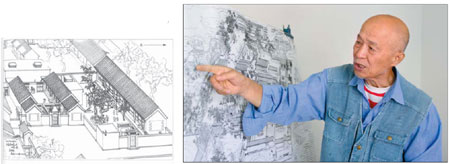
 |
|
Zheng Xicheng cherishes the memory of his childhood spent in a courtyard house on Jiudaowan Xixiang. He captures it all in a sketch published in his books. Liu Zhe / China Daily |
Ancient houses in Beijing hutong are now selling for a price that goes beyond silver and gold. Tiffany Tan and Sun Ye investigate the where, who, what and how.
Zheng Xicheng isn't exactly thrilled at the prospect of getting his hands on 7 million yuan ($1.10m) and buying his own apartment. The 74-year-old would rather continue staying in his childhood home, a courtyard house on Jiudaowan Xixiang, a hutong on the northeastern corner of Beijing's former city walls. But Zheng's elder brother, and co-owner of the property, is set on selling since he's facing pressure from one of his two sons. "His daughter-in-law with the older son told his wife, 'You should already think about how to divide our inheritance'," says Zheng, who lives in the seven-room courtyard home with his wife, daughter and a grandchild.
"My elder brother became very angry, saying, 'I'm not dead yet, but they've already come to discuss their inheritance'."
This is a common story among the owners of the Chinese capital's courtyard houses, many of which belong to the old families of Beijing.
If it were up to Zheng, a retired ivory carver, he would turn his childhood home into a museum for Beijing's courtyard homes, or siheyuan.
In the last 10 years, he has sketched the layouts of at least a hundred such homes - quadrangles usually bordered on all sides by living quarters - and published two books on the subject in an effort to preserve a piece of the city's fast-disappearing ancient residences.
The artist, who survives on his pension and a trickle of royalties, has no way to buy out his brother. So, respecting his sibling's wish, Zheng put up his home for sale in 2009. To date, he's still waiting for the right offer.
Since the market for Beijing's courtyard homes began growing in 2003, elderly owners wanting to sort out their children's inheritance have made up the majority of sellers, according to real estate agents who specialize in selling courtyard homes.
If a siheyuan has more than one owner, the consent of all titleholders is necessary before the property can be sold. Some joint owners, anticipating the disagreements that can arise among their heirs, decide it may be better to simply sell the property and divide the money now.
"When the head of the family dies, this property becomes an inheritance, and there can be many beneficiaries. In some cases, at least 20," says Miao Weilan, manager of Jiaxingjia, an agency that brokers courtyard home sales.
"Also, it's often not pre-arranged as to which room goes to whom. Even if the rooms have been assigned, who is responsible for renovating the yard? Because most homes are very old, and some leak when it rains, ordinary people can't afford the renovation and would rather sell them, then buy new apartments."